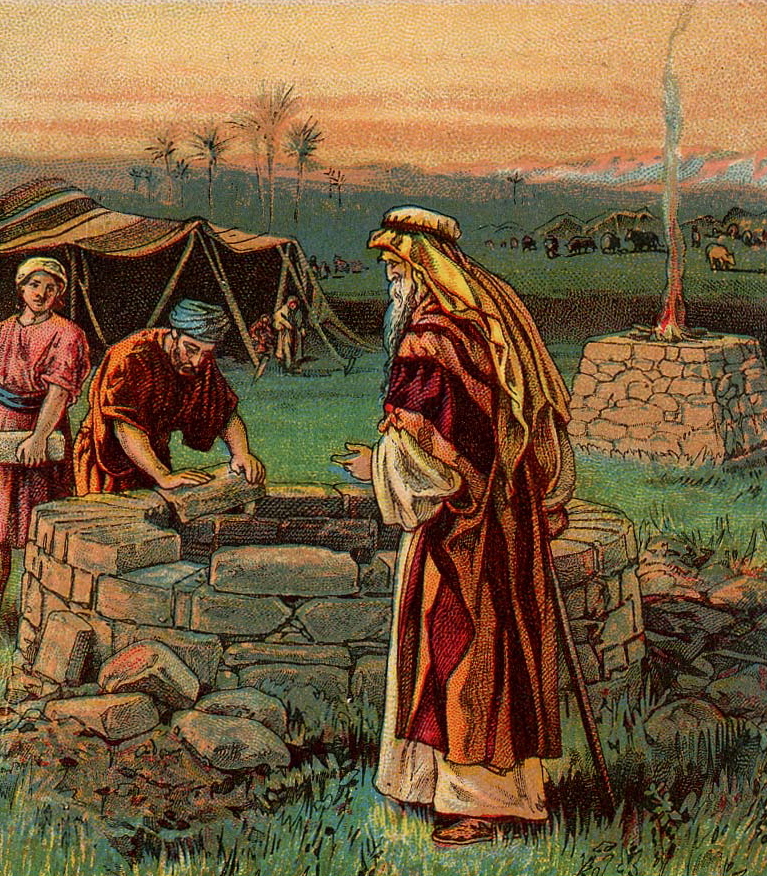This post is part of the General Conference Odyssey.
The Saturday morning session of the October 1972 General Conference was another one of those sessions where there was one talk that stood out to me in a singular way. This time the talk was Altar, Tent, Well by Elder M. Theodore Tuttle.
Elder Tuttle begins by quoting from Genesis 26:25: “And Isaac builded an altar there, and called upon the name of the Lord, and pitched his tent there: and there Isaac’s servants digged a well.”
Then Elder Tuttle notes contrasts Isaac with is father (Abraham) and his son (Jacob):
[Isaac] did not reach the heights of Abraham… nor was he as impressive as his son Israel… yet Isaac is loved and revered. He worshiped God, cared for his home, and pursued his work. He is remembered simply as a man of peace. The eloquent simplicity of his life and his unique ability to lend importance to the commonplace made him great.
Isaac’s life, Elder Tuttle says, can be a template for our lives. His day to day concerns are our day to day concerns: altar, tent, and well: worship, home, and work. Elder Tuttle notes, “These basic things of life signified his relationship to God, his family, and his fellowmen. Every person on earth is touched by these three.”
In just a couple of short paragraphs, Elder Tuttle has captured the essence of Mormonism as a practical experience. This, to a great extent, is what it means to live as a Mormon: we seek holiness through the mundane by work and by relationships. Mormons do not try to escape the world to seek our destiny. We realize that many aspects of the world enable us to find that destiny right here and right now.
And so there is nothing poetic about Elder Tuttle’s statement that “To Latter-day Saints, the home is a holy place.” That’s not a metaphor an exaggeration. It’s our theology. The home is “patterned after the celestial home whence we came.” We affirm that God is our Father. We believe that we also have a Mother. We believe our parents want us to become like them. Home is the place where that happens. Home is not heaven quite yet—none of our families are perfect—but home is heaven’s construction site.
This work is mundane. The task of building heaven is not a task of great deeds or dramatic confrontations. It is a chore of practicing kind responses when we’re stressed and tired. It’s the discipline of constantly having to reconsider our priorities. It’s the labor of wrestling our recalcitrant personalities into congruence with love in countless small, unnoticed battles day in and day out. It is learning and growth as imperceptible and, when God blesses our lives, as relentless as a tree taking root in the soil and spreading branches towards the sun and the stars.
The work is relational. Of all the virtues we seek after, none is higher than love. And love is a virtue that only exists in the context of relationships. You can be honest with a stranger. You can deal generously with a stranger. But you cannot love a stranger, because love is friendship. Mormon congregations are determined by geography, and this means we can’t shop for a congregation we like. We don’t pick the people we set next to in the pews, and we don’t pick the bishop we like the most either. But this is just a shadow of the blood bonds that make up a family. Not being able to choose your fellow congregationalists is nothing like not being able to choose your parents, your siblings, or your children. The aim of all our mundane work, the objective to which our daily discipline is directed, is nothing but the cultivation of these relationships so that we may, with God’s grace, bring ourselves into harmony with each other.
One consequence of all this emphasis on the family is that, for Mormons, the institution of the Church of Jesus Christ of Latter-day Saints exists to serve the family and not the other way around. “The Church… is a family church,” says Tuttle, and “we may say that a prime purpose of this church is to perfect and exalt the family.”
Elder Tuttle concludes his talk:
How little things have changed since Isaac’s day—the things that really matter. There is the same God of Abraham, Isaac, and Jacob, the same family roles to fill, the same need to work. Altar, tent, and well: these things are essential. Placed in proper perspective by God’s revealed word, they provide at once our greatest challenge and achievement.
Altar, tent, and well. These are why we are here.
—
Check out the other posts from the General Conference Odyssey this week and join our Facebook group to follow along!
- Family–Isn’t It about Time, and Eternity? by G
- Preach in Season and Out of Season by Daniel Ortner
- What makes Mormonism unique? by Michelle Linford
- A Love Story by Jan Tolman

I loved this Nathaniel! It reminded me of one of my favorite essays “Why the Church is as True as the Gospel” by Eugene England!
Thanks, Sandee. A comparison to Brother England is high praise indeed.